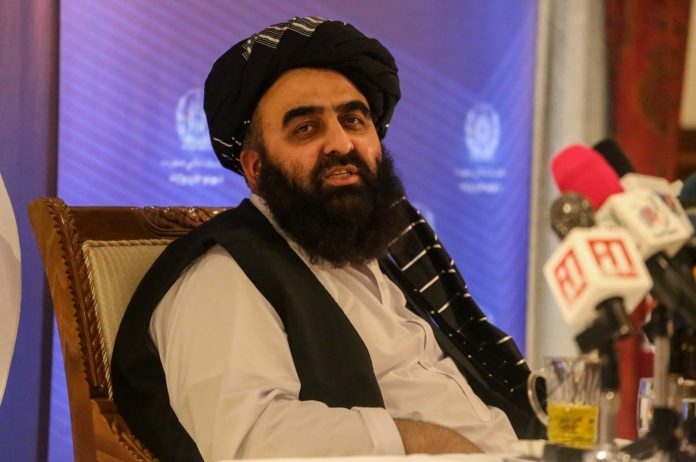Mediating between Pakistan, TTP; no agreement reached yet: Muttaqi

Islamabad: Acting Afghan Foreign Minister Amir Khan Muttaqi has confirmed that they were mediating between Pakistan and the Tehreek-e-Taliban Pakistan (TTP), though no agreement was reached yet.
Muttaqi, who was visiting here mainly to attend Troika Plus meeting, told BBC Urdu in an interview that the Taliban government was mediating on the desire of both the parties in Pakistan.
He said the parties had not yet reached an agreement; the beginning was a good one with the announcement of a month-long ceasefire.
The acting foreign minister said he was hopeful that the process would not come across any difficulties in the future and that the closeness between the TTP and Pakistan would increase.
In what the BBC said was his first interview with a female journalist, Muttaqi said that Daesh was a threat in Afghanistan; however, the Taliban government had eliminated it from a major part of the country.
Acting Afghan Foreign Minister Amir Khan Muttaqi also called on Prime Minister Imran Khan along with his high level delegation.
“Isolated incidents can take place anywhere. Earlier, 70% of Afghanistan was under the control of the Islamic Emirates. Now, Daesh has been purged from all these areas. They existed only in the areas which were ruled by the former Kabul government,” he said.
He said after the Taliban takeover, Daesh started surfacing but their government took effective measures and confined the terrorist group to certain areas.
“The isolated (terrorist) incidents at some places like mosques, can take place anywhere in the world,” he commented.
To a question about the Taliban government’s ties with India, he said Afghanistan did not desire any confrontation with any country including India.
About any reaction from China on closer ties with India, Amir Khan Muttaqi referred to the Moscow summit where the representatives from Pakistan, India, and other countries were present. “We had a positive conversation there and hopefully, we will not oppose any country,” he added.
The Special Representatives attending Troika Plus meeting in Islamabad also called on Acting Afghan Foreign Minister Amir Khan Muttaqi.
The acting foreign minister rubbished the notions of exclusion of women from different fields.
“Women have 100% inclusion in the health sector. They are also teaching in the education sector. We brought improvement on the matter. They are serving in every sector where they are needed. We have no such policy to deny women of their rights in any field,” he remarked.
However, Amir Khan Muttaqi admitted that the educational institutions were yet closed in some areas due to the COVID pandemic.
“Educational institutes are closed in no province. Educational institutes are open across the country. We have divided educational institutes into three categories. All of the boys’ schools are open throughout the country. The girls’ schools up to class 6 are also open in all provinces,” the acting foreign minister said.
He said higher education institutes are also open in some provinces, but not everywhere. So far, 75% of schools have been opened. “But we have not stopped at this point rather working and making progress day by day.”
To a question about the permission for women serving in government or other offices to resume their work, Muttaqi said the Taliban government had not sacked any woman serving during the previous government. No reduction was made in their salaries, and opportunities for their education and employment, he added.
The acting foreign minister said their government fulfilled the international demand of an inclusive government in Afghanistan which represented all stakeholders.
To a question about their future course of action in case the international community did not recognize their government and restore their financial assistance, he said they were advancing ahead in their relations with the world and hope that those ties would strengthen in the future.
He said as their government consisted of representation from all areas and ethnicities, the world should recognize them.
“The incumbent Afghan government comprised the whole of the staff and workers of previous government totaling around 500,000 people. If the world had recognized the previous government as inclusive, then why they don’t do it with our government,” he questioned.
“(From an inclusive government), if they mean a cabinet representing all areas, then we have a minister from Panjshir. People from Badakhshan, Faryab, Kandahar, Nangahar and Kabul are also there. Therefore, every country has its own definition of an inclusive government. But we will continue this effort to enhance inclusivity of our government and grant everyone their right,” he said.





